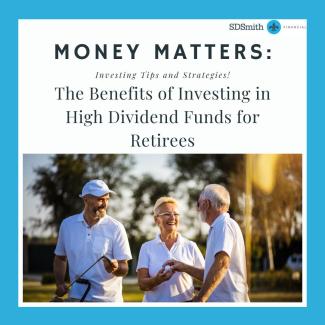
The Potential Benefits of Investing in High Dividend Funds for Retirees
Income in retirement is one of the biggest question marks people face when heading into retirement. In my eBook Retirement Ready: The Ultimate Guide, I discuss using a high dividend yield portfolio. These funds, which focus on stocks that pay higher-than-average dividends, can offer a unique combination of income generation, risk management, and growth potential that can be particularly advantageous for retirees. Let's explore the key reasons why high dividend funds might be an excellent addition to your retirement portfolio.
Steady Income Stream: One of the most appealing aspects of high dividend funds is the steady income stream they provide. Unlike growth stocks, which reinvest earnings to fuel future growth, dividend-paying stocks distribute a portion of their profits directly to shareholders. For retirees, this can mean a regular and predictable source of income, helping to cover living expenses without needing to sell off investments. This reliability can be especially comforting in retirement, when maintaining a stable cash flow is crucial.
Risk Management and Stability: High dividend stocks are often associated with well-established companies that have a history of profitability and financial stability. These companies tend to be in mature industries and have proven business models, making them less volatile than their growth-oriented counterparts. This stability can be a significant advantage for retirees who are typically more risk-averse and less able to recover from substantial market downturns.
Moreover, during turbulent market periods, dividend-paying stocks have historically provided a cushion against losses. Even if the stock price declines, the dividends continue to provide income, which can help mitigate the impact of market volatility on your overall portfolio.
Potential for Growth: While the primary appeal of high dividend funds is income, they also offer the potential for capital appreciation. Many dividend-paying companies are not only stable but also capable of modest growth. As these companies increase their earnings, they often raise their dividend payouts, which can lead to higher income over time. Additionally, the stock prices of these companies can appreciate, providing an opportunity for growth in your investment portfolio.
Tax Advantages: High dividend funds can also offer tax advantages, particularly in a retirement context. Dividends are often taxed at a lower rate than ordinary income, which can be beneficial for retirees who are managing their tax liabilities. Furthermore, if these funds are held within tax-advantaged accounts like IRAs or 401(k)s, the tax impact can be further minimized, allowing for more efficient growth and income generation.
Inflation Hedge: One of the biggest concerns for retirees is inflation, which can erode the purchasing power of fixed-income investments. High dividend funds, however, can serve as a hedge against inflation. As companies raise their prices to keep up with inflation, their revenues and earnings may increase, allowing them to raise their dividend payouts. This can help maintain the real value of your income stream over time, providing some protection against rising costs.
Diversification: Investing in high dividend funds also offers the benefit of diversification. These funds typically include a broad range of dividend-paying stocks from various sectors and industries. This diversification helps spread risk, reducing the impact of any single company's performance on the overall fund. For retirees, diversification is a key component of a well-balanced portfolio, with the goal of contributing to long-term financial stability.
In summary, high dividend funds offer a compelling mix of steady income, risk management, growth potential, tax advantages, and inflation protection. For those in or approaching retirement, these benefits make high dividend funds a strategic addition to an investment portfolio. However, it's essential to remember that all investments come with risks, and it's crucial to assess your individual financial situation, goals, and risk tolerance. Consulting with a financial advisor can help tailor a retirement investment strategy that aligns with your needs as you work toward a secure and comfortable retirement.
Investing in mutual funds is subject to risk and loss of principal. There is no assurance or certainty that any investment strategy will be successful in meeting its objectives.
Before investing in mutual funds, investors should carefully consider a fund’s investment objectives, risks, charges and expenses. Fund prospectuses contain this and other information and may be obtained by asking your financial advisor. Read prospectuses carefully before investing.
While high dividend yields are attractive, it's possible they may be at the expense of the potential growth of the company. It can be assumed that every dollar a company is paying in dividends to its shareholders is a dollar that the company is not reinvesting to grow and generate more capital gains.



